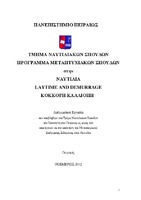Laytime and demurrage

View/
Abstract
Laytime and demurrage comprise one aspect of maritime law, in particular the law relating to voyage charters. Laytime is the period of time allowed by a shipowner to a carrier to carry out cargo loading or discharging operations. The laytime is prescribed in a contract, which is an exchange of obligations and an allocation of risks between the shipowner and the charterer. Each party agrees to accept the risk of certain foreseen circumstances. Laytime commences when the vessel has arrived at the agreed destination, is ready to load or discharge and has tendered a valid NOR. The beginning of laytime may change in proportion with the clauses of the contract. Demurrage is the agreed amount payable to the owner in respect of the delay to the vessel beyond the laytime, for which the owner is not responsible. It has been held that once the vessel is on demurrage, no exceptions will operate to prevent demurrage continuing to be payable, unless the exceptions clause is clearly worded to have this effect. Usually demurrage claim must be submitted within a specified period stated in the contract, failing which the claim will be deemed to have been waived. Demurrage is an important element for each trading company. Basic knowledge of the law relating to voyage charters and proper correspondence among the departments of the company are essential. The preparation of a claim requires contracts, cargo documents and proof of demurrage rate. There are two basic categories of deliveries, the FOB/CIF-CFR-DES when the vessel is company’s fixture or TC and the FOB-FOB or CIF-CFR-DES/ CIF-CFR-DES when the vessel is not company’s fixture.


